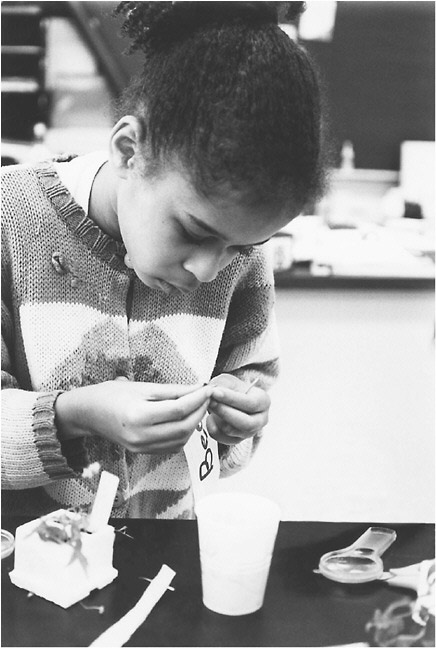7
Frequently Asked Questions About Inquiry
Science teachers, administrators, and teacher educators (both preservice and inservice) often face difficult questions about inquiry-based teaching and learning. Many of these questions they raise themselves. Others come from teachers, administrators, preservice teachers, students, and parents who are unfamiliar with this perspective on learning and teaching science. This chapter presents answers to some of the most commonly asked questions. Other chapters respond to additional questions that may be asked.
 In inquiry-based teaching, is it ever okay to tell students the answers to their questions?
In inquiry-based teaching, is it ever okay to tell students the answers to their questions?
 Yes. Understanding requires knowledge, and not all the knowledge that is needed can be acquired by inquiry. Decisions about how to respond to students’ questions depend on the teacher’s goals and the context of the discussion. For example, a student may pose the question “What is the boiling point of water at sea level?” One way to respond to that question would be to set up a simple investigation to find out. The investigation could set the stage for more complex inquiries. If learning to use reference material is important, a teacher might have the student look up the information. Or, if there is a higher priority for how the student spends his or her time, the teacher could simply provide the answer.
Yes. Understanding requires knowledge, and not all the knowledge that is needed can be acquired by inquiry. Decisions about how to respond to students’ questions depend on the teacher’s goals and the context of the discussion. For example, a student may pose the question “What is the boiling point of water at sea level?” One way to respond to that question would be to set up a simple investigation to find out. The investigation could set the stage for more complex inquiries. If learning to use reference material is important, a teacher might have the student look up the information. Or, if there is a higher priority for how the student spends his or her time, the teacher could simply provide the answer.
The important point is that investigations lead to deeper understanding and greater transfer of knowledge. Decisions about responding to students’ questions should reflect that fact.
 Should a teacher ever say “no” to an investigation that students propose themselves?
Should a teacher ever say “no” to an investigation that students propose themselves?
 Yes. As noted in the previous answer, a teacher’s response should depend on his or her goals for the students. What might they learn if they conducted the inquiry? Are there cost or safety concerns that might weigh against doing a particular investigation? What topics and approaches are most feasible in light of the school science curriculum and guiding standards? Would it be best for students to design their own investigations or conduct investigations proposed either by the teacher or provided by the instructional materials?
Yes. As noted in the previous answer, a teacher’s response should depend on his or her goals for the students. What might they learn if they conducted the inquiry? Are there cost or safety concerns that might weigh against doing a particular investigation? What topics and approaches are most feasible in light of the school science curriculum and guiding standards? Would it be best for students to design their own investigations or conduct investigations proposed either by the teacher or provided by the instructional materials?
A large number of learning outcomes, particularly inquiry abilities, are best learned through investigations, and those motivated by students’ own questions can be invaluable learning opportunities. Students also learn the characteristics of questions that can be properly investigated if they have opportunities to pose and investigate questions. One approach might be for teachers to ask students (or help them determine) what learning goals they will achieve by pursuing their questions and which goals they will not achieve.
The fact that students are motivated to ask questions and inquire into them is an indication that the teacher is making science relevant and exciting. But not all investigations that students propose will be worth pursuing.
 Is it more important for students to learn the abilities of scientific inquiry or scientific concepts and principles?
Is it more important for students to learn the abilities of scientific inquiry or scientific concepts and principles?
 They need to learn both. Further- more, as the National Science Education Standards make clear, these are equally important learning outcomes that support each other.
They need to learn both. Further- more, as the National Science Education Standards make clear, these are equally important learning outcomes that support each other.
In many teaching and learning sequences, students employ inquiry abilities to develop understanding of scientific concepts. Sometimes teachers assume that students develop inquiry abilities just because they use them. However, there is no guarantee of this. Instead, teachers have to work to ensure a proper balance between learning scientific concepts and inquiry abilities.
The development of inquiry abilities should be an explicit student learning outcome. Teachers can select specific abilities on which to focus and develop strategies to achieve those outcomes.
The vignettes in Chapter 3 demonstrate how the learning of science content and improving inquiry abilities can be symbiotic. Scientific concepts and inquiry abilities switch from primary to secondary focus and back again as needed to promote the effective integration of both. Also, as pointed out in Chapter 6, research
describes expertise as knowing both the subject matter content (the “big ideas” of the disciplines) and the ways of inquiring into new questions — and it makes the case for teaching both.
 How can students do a science investigation before they have learned the vocabulary words with which to describe the results?
How can students do a science investigation before they have learned the vocabulary words with which to describe the results?
 Scientific investigations, whether conducted by students or scientists, begin with observations of something interesting or perplexing, which lead to scientific questions, and then to reflections on what the person already knows about the question. It may seem that students need some concepts and vocabulary to begin, but investigations can be designed and carried out without knowing all the specific terms and definitions involved. In fact, the observations, data collection, and analysis involved in an investigation generally provide the context for developing operational definitions, science concepts, inquiry abilities, and an understanding of scientific inquiry, which can later be associated with names or “vocabulary.” This is well illustrated in the vignettes in earlier chapters, and is advocated in the Foreword.
Scientific investigations, whether conducted by students or scientists, begin with observations of something interesting or perplexing, which lead to scientific questions, and then to reflections on what the person already knows about the question. It may seem that students need some concepts and vocabulary to begin, but investigations can be designed and carried out without knowing all the specific terms and definitions involved. In fact, the observations, data collection, and analysis involved in an investigation generally provide the context for developing operational definitions, science concepts, inquiry abilities, and an understanding of scientific inquiry, which can later be associated with names or “vocabulary.” This is well illustrated in the vignettes in earlier chapters, and is advocated in the Foreword.
Knowing vocabulary does not necessarily help students develop or understand explanations. Rather, once students begin to build and understand explanations for their observations, the proper names and definitions associated with those events become useful and meaningful. In essence, words become symbols for their understanding of the phenomena. As a result, definitions based on direct experience more often result in understanding than just memorizing words.
The issue of vocabulary development is particularly relevant to working with students who are English-language learners. As noted in
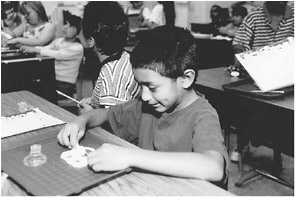
Chapters 4 and 6, teachers of these students need to pay special attention to whether assessment of students’ science knowledge is confounded by their use of the language, and to how student learning is supported when their language skills are just developing. As noted in research synthesized by Fradd and Lee (1999), when formulating their teaching strategies, teachers need to consider how stu
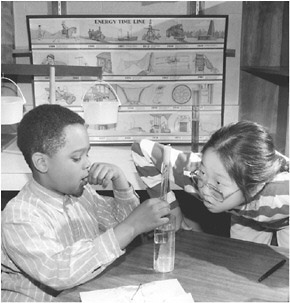
dents of diverse cultures and languages think about science, the experiences they have had in learning science, and, ultimately, how to structure new science learning experiences to optimize students’ opportunities to learn important science concepts and inquiry abilities. The degree of structure given to lessons and the amount of direct “teaching” of inquiry skills need to depend on teachers’ keen assessment of students’ language development, current science knowledge, skills, and beliefs, and cultural orientations (Fradd and Lee, 1999).
 Why did the Standards choose to leave out the science process skills such as observing, classifying, predicting, and hypothesizing?
Why did the Standards choose to leave out the science process skills such as observing, classifying, predicting, and hypothesizing?
 The “process skills” emphasized in earlier science education reforms may appear to be missing from the Standards, but they are not. Rather, they are integrated into the broader abilities of scientific inquiry. As the Standards point out, “The standards on inquiry highlight the abilities of inquiry and the development of an understanding about scientific inquiry. Students at all grade levels and in every domain of science should have the opportunity to use scientific inquiry and develop the ability to think and act in ways associated with inquiry, including asking questions, planning and conducting investigations, using appropriate tools and techniques to gather data, thinking critically and logically about relationships between evidence and explanations, constructing and analyzing alternative explanations, and communicating scientific arguments” (National Research Council, 1996, p. 105). The Standards thus include the “processes of science” and require that students combine those processes and scientific knowledge to develop their understanding of science.
The “process skills” emphasized in earlier science education reforms may appear to be missing from the Standards, but they are not. Rather, they are integrated into the broader abilities of scientific inquiry. As the Standards point out, “The standards on inquiry highlight the abilities of inquiry and the development of an understanding about scientific inquiry. Students at all grade levels and in every domain of science should have the opportunity to use scientific inquiry and develop the ability to think and act in ways associated with inquiry, including asking questions, planning and conducting investigations, using appropriate tools and techniques to gather data, thinking critically and logically about relationships between evidence and explanations, constructing and analyzing alternative explanations, and communicating scientific arguments” (National Research Council, 1996, p. 105). The Standards thus include the “processes of science” and require that students combine those processes and scientific knowledge to develop their understanding of science.
 Do the Standards imply that teachers should use inquiry in every lesson?
Do the Standards imply that teachers should use inquiry in every lesson?
 No. In fact, the Standards emphasize that many teaching approaches can serve the goal of learning science:
No. In fact, the Standards emphasize that many teaching approaches can serve the goal of learning science:
“Although the Standards emphasize inquiry, this should not be interpreted as recommending a single approach to science teaching. Teachers should use different strategies to develop the knowledge, understandings, and abilities described in the content standards. Conducting hands-on science activities does not guarantee inquiry, nor is reading about science incompatible with inquiry” (National Research Council, 1996, p. 23).
Everyone knows that investigations often take longer than other ways of learning, and there are simply not enough hours or days in the school year to learn everything through inquiry. The challenge to the teacher is to make the most judicious choices about which learning goals can be best reached through inquiry (remembering that deep understanding is most likely to result from inquiry), and what the nature of that inquiry should be (see Chapter 2 for some variations). Other teaching strategies can come into play for other learning goals.
 How can teachers cover everything in the curriculum if they use inquiry-oriented materials and teaching methods?
How can teachers cover everything in the curriculum if they use inquiry-oriented materials and teaching methods?
 As noted above, the Standards do not suggest that all science should be learned through inquiry. However, investigations are important ways to promote deep understanding of science content and the only way to help students practice inquiry abilities. So there is still the issue of coverage vs. learning strategy to address.
As noted above, the Standards do not suggest that all science should be learned through inquiry. However, investigations are important ways to promote deep understanding of science content and the only way to help students practice inquiry abilities. So there is still the issue of coverage vs. learning strategy to address.
Analysis of data collected in the Third International Mathematics and Science Study (TIMSS) reveals that the typical U.S. eighth-grade science textbook includes about 65 topics. A similarly large number of science topics appears yearly in state and local science standards and curriculum guides. Teachers, understandably, feel obligated to teach all of the topics called for in their local science curriculum. The result can be the “mile wide and an inch deep” curriculum often decried in U.S. education. Furthermore, research shows that this “cover everything” approach provides few opportunities for students to acquire anything but surface knowledge on any topic (Schmidt et al., 1997).
There are several steps that teachers and administrators can take to deal with this problem. They can renegotiate the expectations embodied in the curriculum. They can carefully select a few areas to emphasize, spending more time teaching those areas though inquiry. They can carefully analyze the curriculum expectations and combine several learning outcomes in lessons and units. They can work with other grade-level teachers to eliminate the redundancies that
often exist in a curriculum, but rarely deepen understanding. If they teach subjects other than science, they can integrate science outcomes into other subject areas (for example, presenting the findings of an investigation in a language arts lesson).
Teachers and administrators can be helped by district and state decision-makers who can reduce the number of topics that teachers are required to teach.
 How much structure and how much freedom should teachers provide in inquiry-oriented science lessons?
How much structure and how much freedom should teachers provide in inquiry-oriented science lessons?
 The type and amount of structure can vary depending on what is needed to keep students productively engaged in pursuit of a learning outcome. Students with little experience in conducting scientific inquiries will probably require more structure. For example,
The type and amount of structure can vary depending on what is needed to keep students productively engaged in pursuit of a learning outcome. Students with little experience in conducting scientific inquiries will probably require more structure. For example,
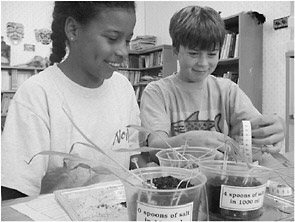
a teacher might want to select the question driving an investigation. She or he also might decide to provide a series of steps and procedures for the students guided by specific questions and group discussion. The instructional materials themselves often provide questions, suggestions, procedures, and data tables to guide student inquiry.
As students mature and gain experience with inquiry, they will become adept at clarifying good questions, designing investigations to test ideas, interpreting data, and forming explanations based on data. With such students, the teacher still should monitor by observation, ask questions for clarification, and make suggestions when needed. Often, teachers begin the school year providing considerable structure and then gradually provide more opportunities for student-centered investigations.
Many teachers in the primary grades have considerable success with whole class projects. An example is a class experiment to answer the question: “What is the ‘black stuff’ on the bottom of the aquarium?” Guided by the teacher, the students can focus and clarify the question. They can ponder where the “black stuff” came from based on their prior knowledge of goldfish, snails, and plants. Using their prior knowledge, the students then can propose explanations and decide what they need to set up a fair test. How many aquariums will they need? What
will be in each aquarium? What are they looking for? How will they know when they have answered the question? After a number of well-structured whole-class inquiries with ample time to discuss procedures and process as well as conclusions and explanations, students are more prepared to design and conduct their own inquires such as the “tree problem” conducted by Mrs. Graham’s fifth-grade class described in Chapter 1.
 How can teachers use inquiry and maintain control of their students?
How can teachers use inquiry and maintain control of their students?
 To have productive experiences, inquiry requires considerable planning and organization on the part of both teachers and students. Teachers need to create systems for organization and management of materials and guidelines for student use of materials and conversation. Students need to learn how to work with materials in an organized fashion, communicate their ideas with one another, listen to each other’s ideas with respect, and accept responsibility for their own learning. In addition, it always is helpful when students know what is expected of them in terms of behavior and performance. As students become collaborators, they recognize the conditions for progress themselves and need less external control, as noted in Chapter 4.
To have productive experiences, inquiry requires considerable planning and organization on the part of both teachers and students. Teachers need to create systems for organization and management of materials and guidelines for student use of materials and conversation. Students need to learn how to work with materials in an organized fashion, communicate their ideas with one another, listen to each other’s ideas with respect, and accept responsibility for their own learning. In addition, it always is helpful when students know what is expected of them in terms of behavior and performance. As students become collaborators, they recognize the conditions for progress themselves and need less external control, as noted in Chapter 4.
 How much do teachers need to know about inquiry and about science subject matter to teach science through inquiry?
How much do teachers need to know about inquiry and about science subject matter to teach science through inquiry?
 The more teachers know about inquiry and about science subject matter, and the more they themselves are effective inquirers, the better equipped they are to engage their students in inquiries that will help them understand scientific concepts and inquiry. It generally does not work for teachers to stay one step ahead of the students when using an inquiry-oriented program.
The more teachers know about inquiry and about science subject matter, and the more they themselves are effective inquirers, the better equipped they are to engage their students in inquiries that will help them understand scientific concepts and inquiry. It generally does not work for teachers to stay one step ahead of the students when using an inquiry-oriented program.
However, to a certain extent, teachers can develop their own understanding through inquiry as they investigate with their students and participate in professional development programs. Teachers also can consult with other teachers to learn more about a topic, refer to science background material printed in teachers guides, participate in professional development, and invite into the classroom parents, scientists, and others who have expertise to help in learning about the topic. Like their students, teachers should view themselves as learners, being eager to try new ways of teaching and extend and sharpen their subject matter knowledge. And they should use their own teaching to inquire about how to improve it, so that their ability to teach through inquiry increases in each successive year.
 What can teachers do who are provided only traditional instructional materials?
What can teachers do who are provided only traditional instructional materials?
 Teachers who want their students to learn to inquire and to learn through inquiry are hampered if their materials are text-based and focus students on memorizing scientific laws and terminology. However, a teacher’s curriculum is not defined by the materials alone, but more broadly by what students focus their attention on, how they learn, and how and on what they are assessed. Teachers can use the Standards to determine goals for
Teachers who want their students to learn to inquire and to learn through inquiry are hampered if their materials are text-based and focus students on memorizing scientific laws and terminology. However, a teacher’s curriculum is not defined by the materials alone, but more broadly by what students focus their attention on, how they learn, and how and on what they are assessed. Teachers can use the Standards to determine goals for
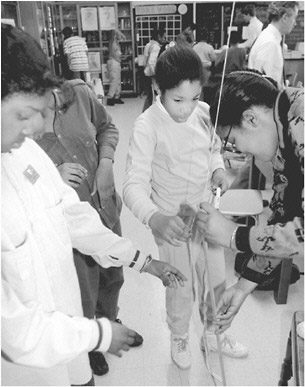
their students and decide which pieces of their materials they can use to help students reach those goals. They can consider decreasing the “cookbook” nature of whatever “labs” or hands-on activities are included with their materials and resequencing them to come before the readings or lectures so students can explore in a concrete may before learning the concepts and terms. Teachers can emphasize learning the major concepts and downplay the vocabulary. They can reconstruct test items to assess major science concepts, inquiry abilities, and understandings about inquiry; they can create one full and open inquiry for students to conduct for several weeks of class. And they can supplement the materials they are given with other materials they receive in professional development or from colleagues, or locate on the Web. The important thing is to determine a set of learning goals for students that reflect the Standards and let those guide how and what students learn. The next question provides ideas about non-text materials.
 Where can teachers get the equipment, materials, and supplies they need to teach through inquiry?
Where can teachers get the equipment, materials, and supplies they need to teach through inquiry?
 The National Science Foundation (NSF) has supported the development and field testing of a number of
The National Science Foundation (NSF) has supported the development and field testing of a number of
inquiry-oriented science curriculum programs (see Appendix C). These science programs, complete with student and teacher guides and materials for student activities or laboratories, are now available through commercial publishers. [See Appendix B for guide to materials selection or Selecting Instructional Materials: A Guide for K-12 Science (NRC, 1999b).] Many districts that have adopted these programs operate a centralized district materials center and loan the materials to teachers. Some districts supply a certain number of kits per grade level that are housed at school sites, with consumable supplies being replenished as needed by the district. Where districts have not adopted such programs, individual teachers and schools have developed a variety of mechanisms to provide needed materials and supplies. Some teachers develop a list of common household materials and supplies and have students collect them from home and bring them to school. Often, a group of teachers at a school will collaborate on a project so they can share materials.
If inquiry is to be the norm rather than an exception, schools must realize that materials are an essential element of teaching and should devote adequate resources and organizational structures to purchase and support use of appropriate materials. Teachers should not be expected to supply the essential supplies of teaching. Chapter 8 discusses strategies for supporting an inquiry-oriented program in more detail.
 Where can teacher educators obtain inquiry-oriented programs to use in preparing teachers?
Where can teacher educators obtain inquiry-oriented programs to use in preparing teachers?
 Many teacher educators use curriculum materials developed for use in K-12 classrooms to help prospective students experience and learn to use inquiry-based materials. In addition, there are materials that can be used by teacher educators, at both the preservice and inservice levels, that are designed to use for teacher learning. Appendix C contains lists of inquiry-based materials for K-12 students and for use with teachers, both prospective and practicing.
Many teacher educators use curriculum materials developed for use in K-12 classrooms to help prospective students experience and learn to use inquiry-based materials. In addition, there are materials that can be used by teacher educators, at both the preservice and inservice levels, that are designed to use for teacher learning. Appendix C contains lists of inquiry-based materials for K-12 students and for use with teachers, both prospective and practicing.
 What barriers are encountered when implementing inquiry-oriented approaches?
What barriers are encountered when implementing inquiry-oriented approaches?
 In addition to the external barriers teachers face, their beliefs and values about students, teaching, and the purposes of education can impose obstacles to inquiry-oriented approaches. Research demonstrates many of the predicaments that teachers face when considering new approaches. In a cross-site analysis of schools that had successfully initiated new approaches to science and mathematics instruction,
In addition to the external barriers teachers face, their beliefs and values about students, teaching, and the purposes of education can impose obstacles to inquiry-oriented approaches. Research demonstrates many of the predicaments that teachers face when considering new approaches. In a cross-site analysis of schools that had successfully initiated new approaches to science and mathematics instruction,
three kinds of problems were noted: technical, political, and cultural (Anderson, 1996). Technical problems included limited teaching abilities, prior commitments (for example, to a textbook), the challenges of assessment, difficulties of group work, the challenges of new teacher roles, the challenges of new student roles, and inadequate in-service education. Political problems included limited in-service education (i.e., not sustained for a sufficient number of years), parental resistance, resistance from principals and superintendents, unresolved conflicts among teachers, lack of resources, and differing judgments about justice and fairness. Cultural problems — possibly the most important because beliefs and values are central to them — included the textbook issue, views of assessment, and the “preparation ethic” (i.e., an overriding commitment to “coverage” because of a perceived need to prepare students for the next level of schooling). In addition to this study’s findings, barriers experienced currently include the widespread attitude that science is not a “basic” and the lack of appropriate instructional materials, both print and hands-on.
 How can teachers improve their use of inquiry in science teaching?
How can teachers improve their use of inquiry in science teaching?
 Research indicates that teachers have a fairly pragmatic approach to teaching. They tend to focus on what works to involve students or manage their classrooms, rather than on melding theory and practice (Blumenfeld, 1994). Teachers anchor their understanding in classroom events and base their actions on stories and narratives more than on theories and propositional knowledge (Krajcik et al., 1994). Thus, theory, beliefs, values, and understandings are important as teachers acquire an inquiry approach, but teachers should not be expected to address such mental constructs in isolation from their teaching context.
Research indicates that teachers have a fairly pragmatic approach to teaching. They tend to focus on what works to involve students or manage their classrooms, rather than on melding theory and practice (Blumenfeld, 1994). Teachers anchor their understanding in classroom events and base their actions on stories and narratives more than on theories and propositional knowledge (Krajcik et al., 1994). Thus, theory, beliefs, values, and understandings are important as teachers acquire an inquiry approach, but teachers should not be expected to address such mental constructs in isolation from their teaching context.
Collaboration can be an important catalyst of change. New understandings develop and new classroom practices emerge when teachers collaborate with peers and experts. Collaboration addresses not only the technical problems of reform but cultural issues as well. As Anderson (1996) says, “Collaborative working relationships among teachers provide a very important context for the re-assessment of educational values and beliefs. In this context — where the focus is the actual work of each teachers’ own students — one’s values and beliefs are encountered at every turn. It is a powerful influence. The reforming teachers in our cases did not do their work in isola-
tion; they worked together with fellow teachers in their team or department. Crucial reform work takes place in this context.” Collaboration stimulates the reflection that is fundamental to changing beliefs, values, and understandings.
The appropriate professional development is a powerful way for teachers to improve their use of inquiry, as long as it is viewed as support for ongoing learning that is apt to take many years to change teaching practice significantly. Teachers can become wise consumers of professional development as they broaden their images and sources of learning, as well illustrated in Chapter 5.

